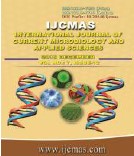


 National Academy of Agricultural Sciences (NAAS)
National Academy of Agricultural Sciences (NAAS)

|
PRINT ISSN : 2319-7692
Online ISSN : 2319-7706 Issues : 12 per year Publisher : Excellent Publishers Email : editorijcmas@gmail.com / submit@ijcmas.com Editor-in-chief: Dr.M.Prakash Index Copernicus ICV 2018: 95.39 NAAS RATING 2020: 5.38 |
Agricultural production needs to maximize on sustainable basis to meet the continuously increasing food demand of mushrooming population. Producing more and quality food from diminishing land and water while sustaining agricultural resource base in an environment friendly manner is a formidable challenge of this century. Nanotechnology is a versatile field and has found application in almost all existing field of science. Nanotechnology research and development is directed towards understanding and creating improved materials, devices and systems that exploit nanoscale properties. It has great potential in biological applications such as nutrient delivery, biosensing and tissue engineering. Nanoparticles have potential applications in agriculture viz. detection of pollutants, plant diseases, pest and pathogens; controlled delivery of pesticide, fertilizers, nutrients and genetic material; and can act as nanoarchitects in formation and binding of soil structure. Nanotechnology has the ability to create a great revolution and transformation in food supply system in a global scope. Micronutrient fertilizers can increase the tolerance of plants to environmental stresses like drought and salinity. It has been postulated that nanoparticles are more effective, can be utilized in agriculture for the precision farming and enhance productivity of crops. Nanofertilizers or nano-encapsulated nutrients might have properties that are effective to crops, due to release the nutrients on-demand, controlled release of chemical fertilizers that regulate plant growth and enhanced target activity. Nanoparticles have unique physicochemical properties and key potential to boost the plant metabolism.
 |
 |
 |
 |
 |